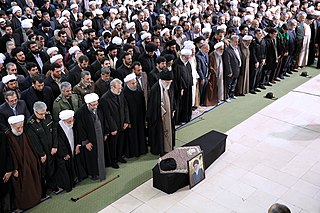Related Research Articles
Shiva is the week-long mourning period in Judaism for first-degree relatives. The ritual is referred to as "sitting shiva" in English. The shiva period lasts for seven days following the burial. Following the initial period of despair and lamentation immediately after the death, shiva embraces a time when individuals discuss their loss and accept the comfort of others.

Eid al-Fitr is the earlier of the two official holidays celebrated within Islam. Eid al-Fitr is celebrated by Muslims worldwide because it marks the end of the month-long dawn-to-sunset fasting of Ramadan. Eid al-Fitr falls on the first day of Shawwal in the Islamic calendar; this does not always fall on the same Gregorian day, as the start of any lunar Hijri month varies based on when the new moon is sighted by local religious authorities. The holiday is known under various other names in different languages and countries around the world. The day is also called Lesser Eid, or simply Eid.

Mourning is the expression of an experience that is the consequence of an event in life involving loss, causing grief, occurring as a result of someone's death, specifically someone who was loved, although loss from death is not exclusively the cause of all experience of grief.

Victory in Europe Day is the day celebrating the formal acceptance by the Allies of World War II of Germany's unconditional surrender of its armed forces on Tuesday, 8 May 1945; it marked the official end of World War II in Europe in the Eastern Front, with the last known shots fired on 11 May. Russia and some former Soviet countries celebrate on 9 May, as Germany's unconditional surrender entered into force at 23:01 on 8 May Central European Time; this corresponded with 01:01 on 9 May in Moscow Time.

Muḥarram is the first month of the Islamic calendar, and one of the four sacred months of the year when warfare is banned. The tenth of Muharram is known as Ashura, an important day of commemoration in Islam. For Sunni Muslims, the day marks the parting of the Red Sea by Moses and the salvation of the Israelites, celebrated through supererogatory fasting and other acceptable expressions of joy. By contrast, Ashura is a day of mourning for Shia Muslims, who annually commemorate the death of Husayn ibn Ali, grandson of the Islamic prophet Muhammad and the third Shia imam. Husayn was killed, alongside most of his relatives and his small retinue, in the Battle of Karbala in 680 CE against the army of the Umayyad caliph Yazid ibn Mu'awiya. The Shia rituals span the first ten days of Muharram, culminating on Ashura with mourning processions in Shia cities. Also in Muharram, the Aqsa mosque in Jerusalem was initially set as the direction of prayer for early Muslims.

Counting of the Omer is a ritual in Judaism. It consists of a verbal counting of each of the 49 days between the holidays of Passover and Shavuot. The period of 49 days is known as the "omer period" or simply as "the omer" or "sefirah".
Public holidays in Croatia are regulated by the Holidays, Memorial Days and Non-Working Days Act.

Yom HaZikaron laShoah ve-laG'vurah, known colloquially in Israel and abroad as Yom HaShoah and in English as Holocaust Remembrance Day, or Holocaust Day, is observed as Israel's day of commemoration for the approximately six million Jews murdered in the Holocaust by Nazi Germany and its collaborators, and for the Jewish resistance in that period. In Israel, it is a national memorial day. The first official commemorations took place in 1951, and the observance of the day was anchored in a law passed by the Knesset in 1959. It is held on the 27th of Nisan, unless the 27th would be adjacent to the Jewish Sabbath, in which case the date is shifted by a day.

A vigil, from the Latin vigilia meaning 'wakefulness', is a period of purposeful sleeplessness, an occasion for devotional watching, or an observance. The Italian word vigilia has become generalized in this sense and means 'eve'.

Half-mast or half-staff refers to a flag flying below the summit of a ship mast, a pole on land, or a pole on a building. In many countries this is seen as a symbol of respect, mourning, distress, or, in some cases, a salute.
A national day of mourning is a day, or one of several days, marked by mourning and memorial activities observed among the majority of a country's populace. They are designated by the national government. Such days include those marking the death or funeral of a renowned individual or individuals from that country or elsewhere or the anniversary of such a death or deaths, the anniversaries of a significant natural or man-made disaster occurring either in the country or another country, wartime commemorations or in memory of the victims of a terrorist attack. Flying a national or military flag of that country at half-mast is a common symbol.

Hosay is a Muslim Indo-Caribbean commemoration that is popularly observed in Trinidad and Tobago and Jamaica. In Trinidad and Tobago, multi-coloured model mausoleums or mosque-shaped model tombs known as tadjah are used to display the symbolic part of this commemoration. They are built and paraded, then ritually taken to the sea on last day of observance, and finally discarded into the water. The word tadjah derived from the Arabic word ta'zieh and signifies different cultural meanings depending on the region, time period, occasion, and religion. In Guyana, and Suriname, the festival is called Taziya or in Caribbean Hindustani tadjah in reference to these floats, arguably the most visible and decorative element of this festival.

The Birth of Baháʼu'lláh is one of nine holy days in the Baháʼí calendar that is celebrated by adherents of the Baháʼí Faith and during which work is suspended. The holy day celebrates the birth of Baháʼu'lláh, the founder of the Baháʼí Faith. The 2023 date is October 17.

Funerals and funeral prayers in Islam follow fairly specific rites, though they are subject to regional interpretation and variation in custom. In all cases, however, sharia calls for burial of the body as soon as possible, preceded by a simple ritual involving bathing and shrouding the body, followed by Salat al-jinazah. Burial is usually within 24 hours of death to protect the living from any sanitary issues, except in the case of a person killed in battle or when foul play is suspected; in those cases it is important to determine the cause of death before burial. In Islam, mourning for the deceased is observed for four days by the relatives.
Martyrs' Day are days observed in or by some countries, incl. the United States, Japan, India, Brazil, Canada and Australia, to recognise martyrs such as soldiers, revolutionaries or victims of genocide. Below is a list of various Martyrs' Days for different countries of the World.

The mourning of Muharram is a set of religious rituals observed predominantly by Shia Muslims, largely during the month of Muharram, the first month of the Islamic calendar. These annual rituals commemorate the death of Husayn ibn Ali, grandson of the Islamic prophet Muhammad and the third Shia imam. Husayn and his small retinue were slaughtered in the Battle of Karbala on 10 Muharram 61 AH against the army of the Umayyad caliph Yazid ibn Mu'awiya. The battle followed Husayn's refusal to pledge his allegiance to Yazid, who is often portrayed by Muslim historians as impious and immoral. In Shia Islam, Karbala symbolizes the eternal struggle between good and evil, the pinnacle of self-sacrifice, and the ultimate sabotage of Muhammad's prophetic mission. Historically, the event served to crystallize the Shia community into a distinct sect and remains an integral part of their religious identity to date.

A death anniversary is the anniversary of the death of a person. It is the opposite of birthday. It is a custom in several Asian cultures, including Azerbaijan, Armenia, Cambodia, China, Georgia, Hong Kong, Taiwan, India, Myanmar, Iran, Israel, Japan, Bangladesh, Korea, Nepal, Pakistan, the Philippines, Russia, Sri Lanka and Vietnam, as well as in other places with significant overseas Chinese, Japanese, Jewish, Korean, and Vietnamese populations, to observe the anniversary on which a family member or other significant individual died. There are also similar memorial services that are held at different intervals, such as every week.
The following are 11 public holidays in Ukraine.

The September 11 attacks were condemned by world leaders and other political and religious representatives and the international media, as well as numerous memorials and services all over the world. The attacks were widely condemned by the governments of the world, including those traditionally considered hostile to the United States, such as Cuba, Iran, Libya, and North Korea. However, in a few cases celebrations of the attacks were also reported, and some groups and individuals accused the United States in effect of bringing the attacks on itself. These reports have been uncorroborated and many have been linked to unsubstantiated conspiracy theories.

The Islamic month of Muharram is a period of mourning in Shia Islam and commemorates the death of Imam Hussain, the third Imam, and his companions at the Battle of Karbala in 680 AD. Processions called Azadari are held to commemorate and remember the events that took place, these are often organised by congregation halls known as Hussainia. Mourning climaxes on the tenth day of Muharram, Ashura. The mourning is sometimes referred to as the Remembrance of Muharram.